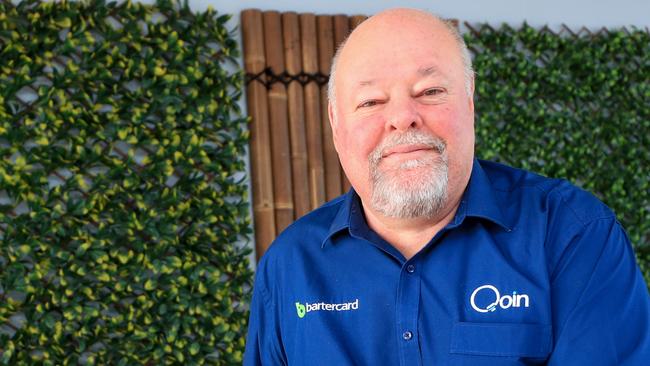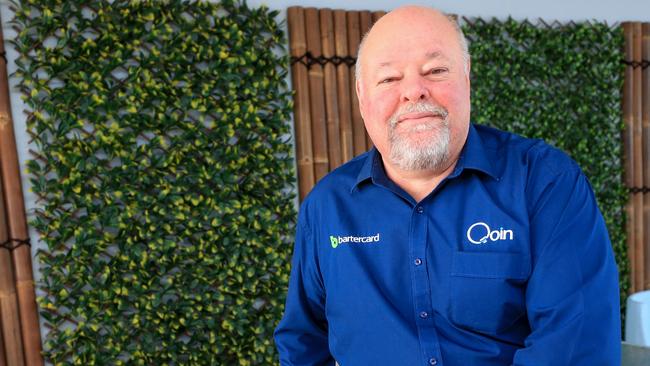Gold Coast promoters of the Qoin cryptocurrency have been hit with a $100m class action
About 250 merchants, agents, investors and other clients of the Qoin cryptocurrency have joined a $100m class action.

Embattled Gold Coast promoters of the Qoin cryptocurrency have been hit with a class action expected to seek $100m or more in damages.
Salerno Law filed the lawsuit this week in Federal Court against business partners Tony Wiese and Raj Pathak, along with three of their related entities and another two firms which serve as Australian Financial Services Licence holders for the group.
About 250 merchants, agents, investors and other clients who claim they have suffered substantial financial damage have already joined the case, which alleges unconscionable conduct and misleading or deceptive conduct.
The lead applicant is tech firm Appzoola Pty Ltd, a Mermaid Waters-based company which offers website and mobile app development services.
Mr Wiese vowed Friday that his group would “rigorously defend’’ the matter.
“We find their allegations are baseless. They have a very clear misunderstanding of the project and the claim is riddled with errors,’’ he said.

“We’re not concerned at all on the merits of it. We have been doing the right thing since day one. What disturbs us is the media sensation and negativity. It’s lie upon lie upon lie.’’
The legal action is focused primarily on Southport-based BPS Financial Limited, which is controlled by Mr Wiese and Mr Pathak as co-directors.
The two men also jointly oversee Bartercard, which launched 30 years ago and allows businesses to exchange goods and services without cash.
BPS unveiled the Qoin token in late 2019 and it now claims to have more than 38,655 validated merchants, 100,000 “wallet holders’’ and a market capitalisation of $3bn.
Yet, unlike most other cryptocurrencies which allow for free trade, the Qoin tokens can be swapped as a digital currency only via Block Trade Exchange Limited, known as the BTX Exchange.
Mr Wiese and Mr Pathak are the sole directors of BTX, which has prompted critics to allege that it is a closed system that creates a potential conflict of interest.
“It is alleged in the class action that the entities behind Qoin engaged in unconscionable conduct through their actions in relation to the BTX Exchange, and also misleading or deceptive conduct as a result of the various representations made to induce consumers, merchants and investors into acquiring the Qoin token,’’ Salerno Law managing partner Cliff Savala said.
“This alleged conduct by Qoin has led to token holders, which include small businesses, sole traders, individuals and investors, being left without the free-market ability to exchange the token for cash and also unable to utilise the token within the ecosystem as previously represented.

“This alleged conduct has ultimately cost token holders millions of dollars in losses as a result of exchanging goods and services or acquiring the token at a value set by Qoin which has no substantive basis and breaches both accepted cryptocurrency and financial services norms.’’
Mr Savala said the class action will run on an “opt out’’ basis, meaning that all Qoin clients could benefit from a legal victory unless they specifically alert Salerno Law they do not want to be a part of the case.
BPS maintains that there are currently 394 million Qoin token with an advertised buy price of $9.21, up substantially from the initial issue price of 15 cents.
But Mr Savala noted the amount of Qoin traded in the last 24 hours was worth just $2300.
“In addition, there are restrictions on the sale of Qoin, with the current imposed BTX Exchange sell restriction of $125 per person per day, with any such sales also being subject to buyer demand,’’ he said.
More than 12,000 people had registered for an account with BTX by March this year but then the daily withdrawal limit was slashed from $2000 to $100, creating what the lawsuit alleges is a “failure of liquidity’’. That policy increased the number of sellers and cut the sale price.
The looming courtroom battle comes just months after Qoin faced withering criticism from some of its disgruntled clients on social media and several consumer-focused websites.
Earlier this year it was expelled as a member from peak industry body Blockchain Australia.
In a statement released in February, Blockchain Australia said it had asked for its name and logo to be withdrawn from Qoin marketing material but declined to provide an explanation for why the action was taken.
Qoin vehemently denounced the move. It said the timing “aligns with the emergence of false and misleading comments ... made by certain antagonists on social media platforms, including a previous board member’’.
That was a reference to a former Blockchain Australia director, who had earlier alleged in a tweet that Qoin is the nation’s “biggest crypto scam’’.






To join the conversation, please log in. Don't have an account? Register
Join the conversation, you are commenting as Logout